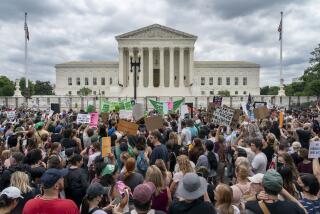Benefit of Surgery Questioned in 2 Studies of Prostate Cancer
- Share via
CHICAGO — Older men with early prostate cancers may benefit as much from “watchful waiting” as from aggressive treatments like radical surgery, which rose in frequency almost sixfold from 1984 to 1990, researchers say in today’s Journal of the American Medical Assn.
“We have, in essence, an epidemic of treatment and no scientific proof that it’s valid,” said Dr. John Wasson, who worked on the two studies in the journal.
In one of the studies, led by Dr. Craig Fleming of Oregon Health Sciences University in Portland, older men who underwent aggressive treatment lived less than a year longer on average than those whose cancer was simply monitored.
In 1990, the rate of prostate removal was 5.75 times higher than in 1984 among Medicare patients over 65, said the other study, led by Grace L. Lu-Yao of Dartmouth Medical School.
Cancer of the prostate, a chestnut-shaped gland beneath the bladder in men, is the most frequent malignancy in American males, with 165,000 new cases expected to be diagnosed this year, 60% of them in early stages, researchers said. It will kill an estimated 35,000 men this year.
The Fleming report, which used a mathematical model to analyze risks and benefits of treatment, said men 65 and older may benefit as much from “watchful waiting” as from surgery or radiation.
For such men, the immediate risk of complications from treatment may not be worth trying to buy extra years of life, the study said. They are likely to die of other causes before their malignancies spread and cause problems, the researchers said.
Most localized prostate cancers grow slowly and may not invade other tissues for years after they are diagnosed.
Radical surgery causes incontinence about 30% of the time and sexual impotence 90% of the time, Wasson said. Heart complications occur in much smaller proportions, but they increase with age.
Fleming’s analysis found that men ages 65 to 70 with localized prostate cancers averaged 14.1 more years of life if their cancers had been watched, compared with 14.2 years for men who had undergone radical prostatectomy and 14.3 years for men who had received radiation treatment.






